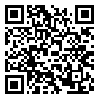دوره 5، شماره 4 - ( 4-1399 )
جلد 5 شماره 4 صفحات 206-199 |
برگشت به فهرست نسخه ها
چکیده: (2151 مشاهده)
Background: During traffic accidents, professional staff provide care to the patient at the scene of the accident and then transport the victim to the hospital by ambulance. But sometimes this transition is carried out by relatives and laypeople. The purpose of this study was to explore the factors affecting people’s involvement and transmission of the victims of the traffic accident.
Materials and Methods: This study was done with a qualitative content analysis method in 2018. The study participants were 16 people. In this study, a purposeful sampling method with maximum diversity was used. Semi-structured interviews were used to collect data using guiding questions. To observe the research ethics, the researcher, after obtaining permission from the University Ethics Committee, conducted interviews (IR.USWR.REC.1395.399).
Results: In total, 15 spinal cord injury victims and their relatives or laypeople and medical emergency technicians were interviewed. The class of wrong belief of delay was the main class in all interviews. Concepts such as past experiences, the pressure time, the lack of emergency time, cultural beliefs, and the tension explaining the wrong belief concept.
Conclusion: Wrong belief of delay was a concept that was extracted from the present study. It is recommended that the scene of the accident be examined in-depth and how to create a spinal cord injury in the injured with a grounded theory approach.
Materials and Methods: This study was done with a qualitative content analysis method in 2018. The study participants were 16 people. In this study, a purposeful sampling method with maximum diversity was used. Semi-structured interviews were used to collect data using guiding questions. To observe the research ethics, the researcher, after obtaining permission from the University Ethics Committee, conducted interviews (IR.USWR.REC.1395.399).
Results: In total, 15 spinal cord injury victims and their relatives or laypeople and medical emergency technicians were interviewed. The class of wrong belief of delay was the main class in all interviews. Concepts such as past experiences, the pressure time, the lack of emergency time, cultural beliefs, and the tension explaining the wrong belief concept.
Conclusion: Wrong belief of delay was a concept that was extracted from the present study. It is recommended that the scene of the accident be examined in-depth and how to create a spinal cord injury in the injured with a grounded theory approach.
| بازنشر اطلاعات | |
 |
این مقاله تحت شرایط Creative Commons Attribution-NonCommercial 4.0 International License قابل بازنشر است. |


